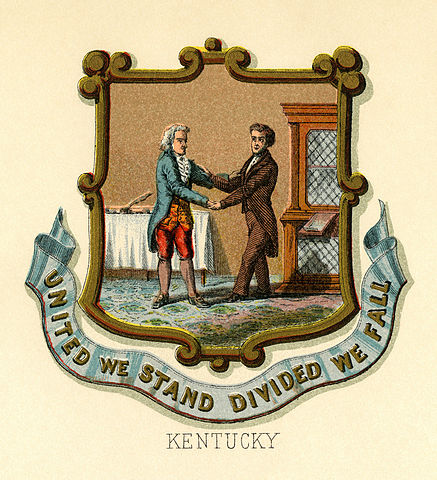
Kentucky’s Education Commissioner Terry Holliday was in the news recently, discussing the treatment of evolution and climate change in the Next Generation Science Standards, which Kentucky’s public schools are scheduled to begin to use in the 2014–2015 school year. When the NGSS were released in their final version, The New York Times (April 9, 2013) observed, “The climate and evolution standards are just two aspects of a set of guidelines containing hundreds of new ideas on how to teach science. But they have already drawn hostile commentary from conservative groups critical of mainstream scientific thinking.” With the exception of Wyoming, nowhere was such hostile commentary so effective as in Kentucky, where a legislative subcommittee voted in September 2013 to block the adoption of the NGSS. It took the decisive action of the governor, Steve Beshear, to ensure that the standards were adopted notwithstanding the subcommittee’s vote.
At the time, Holliday praised the governor’s decision and the standards, saying, in a press release (PDF), “We appreciate the Governor’s courage and wisdom in executing his legal authority to implement the Kentucky Core Academic Standards in science...this is good for Kentucky teachers and it’s good for Kentucky students. As mandated by Senate Bill 1, these new science standards will ensure our graduates are prepared for college and that they will be able to compete with those from around the country and the world.” Now, however, Holliday is hedging on evolution and climate change, telling Kentucky Public Radio (June 9, 2014) that these topics will be considered as theory rather than fact. On climate change, he was quoted as saying, “If there are a lot of facts and data out there that say that the carbon levels in our atmosphere are man-made, but I think it also approaches from a scientific method, then students could look at both cases whether they agree with man-made or don’t agree with man-made, and see what facts support either position.”
Now, that’s somewhat garbled, and it’s hard to know whether the garbling is due to the reporter or to Holliday himself. But the message is clear. In it, two primary themes emerge. First, that there is a distinction in science between fact and theory, where facts are incontrovertible and theories are speculation. Second, and as a consequence of the first, that it is pedagogically appropriate for students to be expected to evaluate scientific theories as complex as climate change. There’s a lot to be said against both of those themes, and my colleagues at NCSE and I have contributed our mite. For example, in 2008, Louise S. Mead and I diagnosed the misuse of “fact” and “theory” as originating with a vulgarization of the philosophy of Francis Bacon and recommended a lesson plan of Judy Scotchmoor’s to help to dislodge it. In 2014, four of us noted that projects such as Holliday suggests, far from being suitable as a high school science class exercise, would in fact involve “a major effort by multiple scientists over the course of years.”
Moreover, the NGSS, which Holliday so praised when Governor Beshear ensured their adoption, themselves contradict the themes implicit in his latest pronouncement. On the meaning of “theory,” for example, the NGSS repeatedly explains, “A scientific theory is a substantiated explanation of some aspect of the natural world, based on a body of facts that have been repeatedly confirmed through observation and experiment,” adding, “the scientific community validates each theory before it is accepted.” (The term “fact” is neither defined nor used in any technical sense in the standards.) On the feasibility of asking students to assess the evidence for global climate change, the NGSS are conspicuously careful to enunciate only realistic expectations of students. When students are asked to “make an evidence-based forecast” of the rate of climate change and its associated impacts, for example, the standards clarify, “Assessment is limited to one example of a climate change and its associated impacts.”
It is only fair to add, though, that the practice of the Kentucky Department of Education is better than the preaching of its commissioner. In 2013, the department prepared a long document summarizing, and responding to, comments from the public about the NGSS, then under consideration (which I discussed [PDF] at length in Evolution: Education and Outreach). Responding to comments reflecting the same misuse of “fact” and “theory,” the department wrote, “In the field of science, facts do not become theories. Rather, theories explain facts.” Responding to comments suggesting that students be presented with alternative scientific explanations (of evolution and climate change in particular, unsurprisingly), the department wrote, “The NGSS include only ideas that are widely supported within the scientific and science education communities and represent core disciplinary ideas that have wide utility for students.” Students can hardly be expected to second-guess the scientific community.
With the hostility evinced toward the NGSS in Kentucky on account of their treatment of evolution and climate change, it is to Holliday’s credit that he is attempting to reassure their critics. Since his own background isn’t in science education—he started his career as a music educator before taking to educational administration, according to the biography on the Kentucky Department of Education’s website—perhaps he can be excused for offering his reassurance in terms that science educators, including those in the department he supervises, properly deplore. In the future, though, I hope that he will take a different line in defending the standards. Evolution and climate change alike are both included in the NGSS because they are scientifically (as well as practically!) important ideas accepted by the scientific community on the basis of overwhelming evidence. That’s a sufficient—indeed, ample—reason for their inclusion in the NGSS. There’s no call for those implementing the standards to downplay, make excuses, or apologize.

